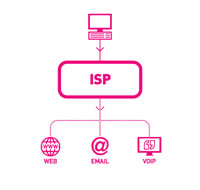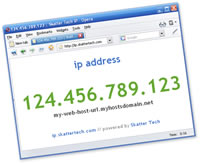Difference between ISP and IP
Key difference: ISP stands for Internet Service Provider. ISP is basically any company that provides you with access to the internet. IP, on the other hand, stands for Internet Protocol. It is a method of data transfer in the internet.
 ISP and IP are terms that are commonly used regarding internet connections. ISP stands for Internet Service Provider. ISP is basically any company that provides you with access to the internet. IP, on the other hand, stands for Internet Protocol. It is a method of data transfer in the internet.
ISP and IP are terms that are commonly used regarding internet connections. ISP stands for Internet Service Provider. ISP is basically any company that provides you with access to the internet. IP, on the other hand, stands for Internet Protocol. It is a method of data transfer in the internet.
Internet service provider (ISP) is a company that provides access to the Internet for a fee. The can either be community-owned and non-profit, or privately owned and for-profit. According to Webopedia, ISP “refers to a company that provides Internet services, including personal and business access to the Internet. For a monthly fee, the service provider usually provides a software package, username, password and access phone number. Equipped with a modem, you can then log on to the Internet and browse the World Wide Web and USENET, and send and receive e-mail.”
Essentially, ISPs directly connect clients to the Internet. They are responsible for maintaining the hardware, such as wires, servers, etc, which are used to connect the user to the internet.

According to Dictionary.com, internet protocol (IP) is “a code used to label packets of data sent across the internet, identifying both the sending and the receiving computers.” It is the principal communications protocol that is used to pass data in the form of network packets across the internet to other users. It is the primary protocol that establishes the Internet.
In order to transfer data from one location to another, it must first know where the users are located. IP distinguishes these as IP addresses. The IP address is a number that describes where on the Internet your computer is located. Hence, the IP usually transfers data from one IP address to another.
The IP was the connectionless datagram service in the original Transmission Control Program, which was introduced by Vint Cerf and Bob Kahn in 1974. The other type of connectionless datagram service was the connection-oriented Transmission Control Protocol (TCP). Hence, the Internet Protocol Suite is often referred to as TCP/IP. Currently, the most commonly used version of IP is the Internet Protocol Version 4 (IPv4). However, its newer version, Internet Protocol Version 6 (IPv6) is increasing in use.
Image Courtesy: ink-spout.blogspot.in, hamzayaqoob.blogspot.in









Add new comment